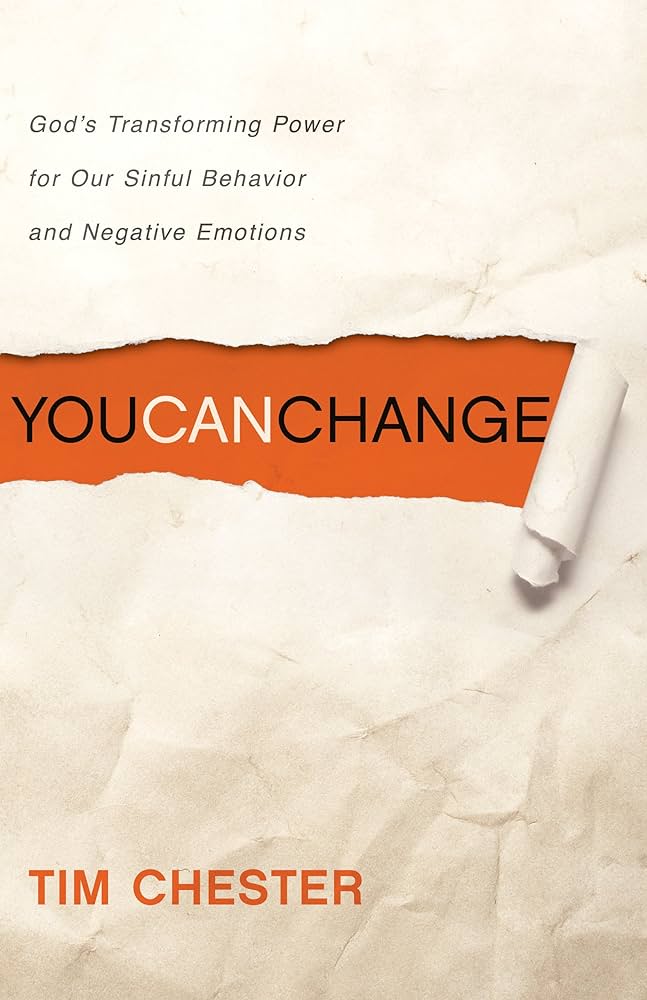
How does this picture relate to the book I am about to review?
Well, I am providing my experience of what I am learning from the book. Let’s call it a dynamic review.
The book in question is:
Tim Chester, You Can Change: God’s Transforming Power for Our Sinful Behavior and Negative Emotions (Crossway, 2010).

I am reading this great little tome for the third time.
Chester sets forth an analysis of why we sin and how wholesome change can take place in our lives. Hopefully, my summary will whet your appetite to read and absorb the helpful contents of this book for your transformation.
First, as to sin, Chester writes:
Sin happens when we believe lies about God instead of God’s Word and when we worship idols instead of worshipping God. (69)
He correctly identifies our heart as “the source of all human behavior and emotions” (65). If we want to change, we need to detect the link between our specific sins and the lies and idols in our hearts.
In general terms, some of our sins are lust, anger, fear, and pride. What lies or idols are behind those sins? Perhaps:
- anger is generated when we cannot control someone or something,
- pride is spawned by a craving to prove ourselves to others,
- lust produces an unsanctified desire demanding satisfaction, or
- fear emanates from inadequacy.
Second, for those who have received Jesus Christ,
God gives us a new identity, and this new identity is the motive and basis for our change (29).
This statement implies some responsibility and action on our part, and Chester rightly states:
salvation from start to finish is God’s work, in which we are active participants through faith and repentance by the grace of God. (55)
Third is God’s Word and its truth, and God’s Spirit and his power.
The Spirit and the Word reveal who God is and equip us to demolish the idols in our hearts.
Chester then presents and develops four truths about God that “offer a powerful diagnostic tool for addressing most of the sins and emotions with which we struggle” (80).
1. God is Great—So We Do Not Have to Be in Control.
2. God is Glorious—So We Do Not Have to Fear Others.
3. God is Good—So We Do Not Have to Look Elsewhere [for our satisfaction].
4. God is Gracious—So We Do Not Have to Prove Ourselves.
Fourth, let me illustrate one of these truths from my own experience.
In February 2016, I was on my way to teach Christian leaders and students in the Gambia, Africa. I was traveling to an unknown situation in a country that had recently declared itself an Islamic republic.
I boarded the flight in Vancouver, Canada, to take a connecting flight at Montreal. There was a narrow window of time to make the connection. The aircraft backed out of the terminal and stopped. Time passed. At 10 minutes, there was an announcement that a part had to be replaced before we could take off. 20 minutes passed, then 30.
Instead of getting anxious or even angry over the delay, I decided to pray about the greatness of God. I left this matter that I could not control in his hands.
After all, God is Great—so I don’t have to be in control.
The aircraft landed in time for me to catch my connecting flight to Brussels. Thank you, Lord.
But then another problem arose.
The next connecting flight in Brussels was in a different terminal than the one I would arrive at, and I had never been to Brussels before. Could I figure out how to get to the other terminal in time?
Okay, John, it’s time to begin relying on the greatness of God instead of yourself.
Seated beside me on the flight to Brussels was a man from Lac St. Jean, Quebec. Believe it or not, my poor French was better than his non-existent English. Hard to believe, I know. Somehow, we figured out that we were on the same flight to Dakar, Senegal, and Banjul, Gambia. Despite our communication difficulties, we happily made our way to the other terminal and boarded the aircraft for Africa.
Again, God is Great—so I don’t have to be in control.
As I landed in Banjul, I went to find my luggage. My backpack was singled out for special attention.
Ah, John. Remember that God is great.
Somehow, I connected with Benjamin, a man I had never met, who would take me to the place where I would live for the next month. On the way, Benjamin pulled to the side of the road and said, “We have a problem.”
He explained that the house I was to stay at had had no electricity or water for days. He had no idea when that would be fixed. Then he asked, “What do you want to do?”
So, we prayed.
Guess what the focus of my prayer was?
You got it, “My Father, I know you are great, and we don’t have control of these things. We leave this in your hands.”
The electricity came on an hour after we arrived. However, water was another matter. Throughout the following weeks, I experienced the truth of this saying:
Things are more difficult in Africa than they need to be.
Numerous times throughout the ensuing weeks, I encountered matters beyond my control and was able to rest in the greatness of the God and Father of our Lord Jesus Christ.
But there was a bigger issue looming on the horizon.
On March 22, 2016, I arrived from Africa at the Brussels airport (Zaventem) for my flight back to Montreal. It was 7:58 a.m. when terrorists detonated their explosives, killing 16 people and injuring many more.

My Father, you are great, so I do not have to be in control.
A week later, I reached home.
I continue to be challenged by things I cannot control. By God’s grace, I am learning to rest in him.
God is Great—So We Do Not Have to Be in Control.
Chester's book also teaches us about other transforming truths about our God:
God is Glorious—So We Do Not Have to Fear Others.
God is Good—So We Do Not Have to Look Elsewhere [for our satisfaction].
God is Gracious—So We Do Not Have to Prove Ourselves.
I encourage you to get a copy of Tim Chester’s book, You Can Change.
You can purchase this book by using this Amazon affiliate link.
You can send your comments and questions to me using this link.
FORWARD TO the next book review
BACK TO the previous book reviews
Photo credits: (1) unknown media (2) book cover (3) Zaventem CCTV
Click "yes" to receive resource-rich newsletters.
Helpful resources provided to 'living theology' subscribers.
YES!